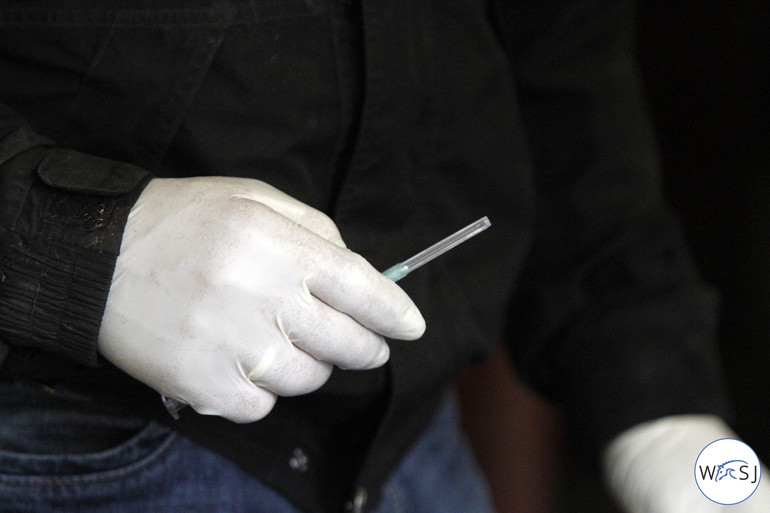Austrian rider Felix Koller has had a standard two-year ineligibility period reduced to one year, after his horse Captain Future 3 tested positive to the banned substance diisopropylamine during CSIO5* St. Gallen last year. The FEI found that there was enough evidence showing that the team vet was in breach of the FEI Veterinary Regulations when outside the treating box, without any treatment record or veterinary forms, had administered multiple injections on the same day as the competition – without Koller’s knowledge. An agreement in the case between the FEI and the rider was approved by the FEI Tribunal earlier this month.
Tests taken from Captain Future during the Swiss event revealed the presence of diisopropylamine – a vasodilator used in the treatment of peripheral and cerebral vascular disorders in humans. Diisopropylamine is classified as a banned substance under the 2019 FEI Equine Prohibited Substances List.
In the decision’s case summary, it is stated that the estimated concentration of diisopropylamine in the sample was in the range of 45-70ug/ml (microgram/microliter) – “(…) which is considered a very high concentration, indicating that the substance was administered to the Horse i.e. through intravenous or intramuscular administration. Such high concentration is highly unlikely to be a result of contaminated feed/supplements.”
Koller provided the FEI with details about Captain Future’s feeding regime as well as a statement from one of his two stable veterinarians, who concluded that the high concentration found in the sample was very unlikely to be a result of contamination caused by supplements – but rather a result of intravenous or intramuscular administration. This presumption was verified by the FEI Veterinary Department. In addition, Koller referred to veterinary records – which confirmed that Captain Future had never been treated with diisopropylamine. In the case summary, it is stated: “At the Event in question, the Team Veterinarian administered to the Horse several products as per his invoice, without the PRs knowledge, especially on the Sunday. The PR only learned about those administrations when he received the invoice which listed several treatments – some of which were given intravenously and by injection.”
As the team vet’s invoice did not provide any information about the specification of the products or substances that had been administered, the FEI took contact for clarifications and requested the medical record. The team vet explained that there was no veterinary record, as is required, but only the invoice. He did, however, submit additional information about the treatments and products administered to the horse.
Furthermore, Koller’s groom submitted a statement where she confirmed that she saw the team vet injecting Captain Future with 2-3 injections on the day of sample collection.
Eventually, the FEI concluded that the high concentration of diisopropylamine in the sample was highly likely to be a result of an injection. Therefore, the FEI found it “very plausible” that the positive finding had been caused by one of the numerous injections performed by the team vet during the event.
The FEI found that Koller has established, on a balance of probabilities, that the team veterinarian during the event administered diisopropylamine through injection to Captain Future and therefore also had established on a balance of probabilities how the prohibited substance entered the horse’s system.
Considering the circumstances in the case, the FEI agreed that Koller had established that he bore no significant fault and negligence for the rule violation – in accordance with EADR art. 10.5.2. “According to this rule, the sanction may not be less than one- half of the period of Ineligibility otherwise applicable (here 2 years for Banned Substance case), namely the minimum for such violation is 1 year,” reads the case summary.
“In the case at hand, the PR has strict procedures in place as described above and is well acquainted with the anti-doping rules. Despite this the Team Veterinarian administered his horse with several injections without his knowledge on the last day of the Event. The PR could not reasonably have known or suspected that the Team Veterinarian would do so without his knowledge, especially given that he had been present all other times the Horse was treated by this veterinarian. He therefore trusted this procedure would be followed for all treatments of his Horse during the Event. Considering those circumstances, the FEI finds that the PR has showed that he bore no significant fault and negligence for the rule violation and in the lower range. The proportionate sanction for the EADR violation in the present case shall therefore be one (1) year ineligibility period,” reads the decision.
After the incident, the team veterinarian has been removed from his position by the Austrian Equestrian Federation. The FEI is investigating to open separate disciplinary proceedings against him in his capacity of support personnel.
Koller has already served the ineligibility period, which ended on August 6, 2020. Koller was also ordered to pay a fine of CHF 1,500.
The Final Tribunal Decision can be found here.
The parties can appeal to the Court of Arbitration for Sport (CAS) within 21 days of receipt of the decision.









